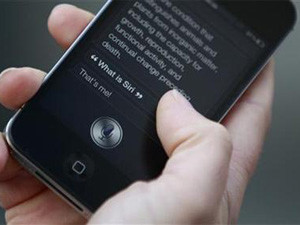
A study shows most consumers are too embarrassed to use voice-operated technology, especially in public. However, analysts say the technology will soon be commonplace as it improves and becomes more useful.
Major tech companies Apple, Google, Microsoft and Amazon are all working on digital assistants powered by artificial intelligence: Siri, OK Google, Cortana and Alexa.
International research firm Creative Strategies did a study to find out how excited consumers were about the technology, and their usage habits.
The study found 21% of those surveyed had never used Siri, 34% had never used OK Google, and 72% had never used Cortana.
The main reason cited for not using the functionality was not being comfortable talking to technology.
"The majority of active users admit to using these features only rarely or sometimes: 70% for Siri and 62% for OK Google," Carolina Milanesi, Creative Strategies consumer tech analyst, said in a statement.
Of the respondents that do use voice assistants, 39% use the technology at home, 51% in the car, 1.3% at work and 6% in public.
Learning curve
"I think voice-operated technology will definitely last but people need to adapt to it," says ICT veteran Adrian Schofield.
"Currently, there is a social inhibition about giving instructions to your mobile device in public, even though the same people have no qualms about carrying on a phone conversation at full volume in the same public space."
However, Arthur Goldstuck, MD of World Wide Worx, says: "Voice assistance applications are perfect examples of solutions in search of a problem. They tend to be invasive, clunky and more prone to error and frustration than other modes of input.
"As they improve, uptake will increase, but for the foreseeable future touch will remain the primary form of input as it is both more accurate and more discreet."
All alone
Schofield says the present value of the technology is in situations where there is nobody around, like in a car or at home.
Brian Neilson, director at BMI-TechKnowledge, says voice-operated technology will probably take off in cars, "where being hands-free is a huge advantage, and then extend to more general usage as more people find the advantages outweigh the embarrassment".
"The benefits are massive in contexts where touch control is difficult or dangerous, such as when driving," says Goldstuck.
"In fact, voice may become the primary interface for the self-driving car of the future. However, current voice control on even the most high-tech of vehicles is shamefully bad. Little wonder that, for standard consumer devices, it barely meets a need."
Ben Bajarin, principal analyst at Creative Strategies and founder of Tech.Pinions, said in an analysis piece about the study: "Voice looks to be a natural extension of our keyboard/mouse/touch-based input and output methods."
He noted the firm asked consumers if they agree that when their voice assistant works, it is great and, when it doesn't, they get irritated. Nearly 50% said they strongly agree and 38% somewhat agree.
"Consumers seem to recognise the value and desire for it to work in more ways. I've long said the true test of a great feature very early in its lifecycle is when it combines both delight and frustration. Once you use it, you're hooked but you want it to be great all the time because you can see the potential."
Apple introduced Siri to the iPhone in 2011 with rudimental functionality. Users needed to press their iPhone's "home" button to summon the voice-activated assistant bot. Last year, an update to the operating system allowed Siri to be activated remotely via the user's voice.
On Tuesday, ITWeb reported that an Australian mother was able to activate Siri from another room and ask the bot to call an ambulance, while she tried to resuscitate her toddler.
Speak out
"As with most adaptations, users need to find out the nuances of voice operation and practise usage to become comfortable with it," says Schofield.
Goldstuck says tech companies working on this technology need to be honest and transparent about the status of what they are pushing.
"Where there is an appreciation of the long way the technology still has to go, people are more tolerant of its shortcomings."
However, Goldstuck says as with smart glasses, "for now, the social liability is too high for use in general public contexts. It's not only about the user overcoming embarrassment; it's also about the willingness of the people in the environment to put up with socially offensive behaviour."
Share